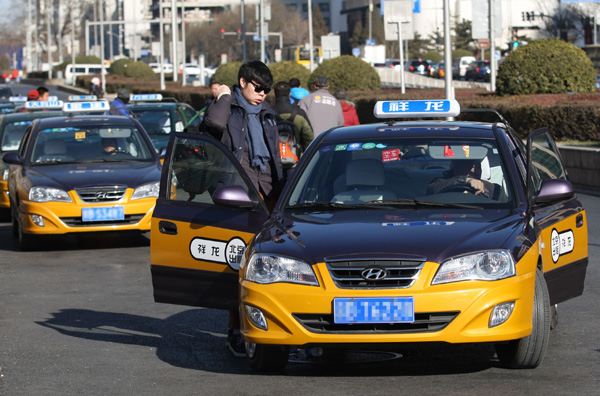 |
|
Taxis near Beijing Railway Station take passengers on Friday. Since Thursday, the Ministry of Transport has prohibited private cars from taking passengers for profit in response to strikes by taxi drivers in some cities. WANG ZHUANGFEI/CHINA DAILY |
High franchise fees, competition from private cars top grievance list
Taxi drivers in Nanjing, Jiangsu province, joined a strike that has swept the country since Thursday afternoon demanding a reduction of the monthly franchise fees paid to taxi companies, which eat up a large share of their revenues.
On Thursday, hundreds of taxis were parked near Nanjing's two railway stations, the long-distance bus station and the airport. Many taxis on the road refused to carry passengers.
On Friday, the city's transportation system was affected at peak times, with many striking taxi drivers suggesting through ride-hailing Internet apps that their colleagues participate.
Workers at the railway stations and the airport asked passengers to switch to buses or subway trains.
Liu Xingyou, a taxi driver, said that he has to pay 7,000 yuan ($1,130) to his company every month, and he only earns about 12,000 yuan.
"But I also need to pay for the natural gas, which is more than 3,000 yuan a month," the 56-year-old said. "I get up before 6 am every morning and sit for about 14 hours a day, only to get 2,000 yuan a month. That's unbearable."
According to Nanjing's transport department, the city now has about 11,700 taxis. Drivers of some new models of vehicles are required to pay a franchise fee of 9,000 yuan a month. Drivers in Beijing and Guangzhou pay about 4,000 or 5,000 yuan.
Licenses for taxi companies have been largely frozen since the early 1990s. Big taxi companies operating today generally got their licenses earlier. They collect fixed fees from individual taxi drivers across the country.
Some drivers also complained that a city's charging standards, low fuel surcharge allowances, five-hour double-billing during peak hours and the new ride-hailing apps have greatly hurt their incomes.
